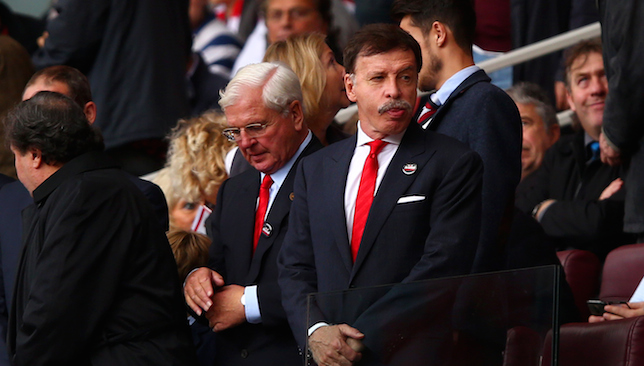
The timing could not have been more imperfect. Just over 24 hours before Arsenal’s troubling FA Cup exit to Watford, majority shareholder Stan Kroenke was outlining his model for ownership.
Speaking at the MIT Sloan Sports Analytics Conference in Boston, Kroenke said: “If you want to win championships then you would never get involved. I think the best owners are the guys that sort of watch both sides a bit.”
It confirmed all the worst fears of Arsenal’s fans; that Kroenke is content with top-four football each season, keeping the balance sheet ticking over as an all-out assault on the title may not make good business sense.
But while they are the most high-profile example, they are not alone in the Premier League.
The economic growth of the English top-flight has attracted owners from near and far, and all for different reasons: pride, vanity, fame, marketing, political gain, fun, but increasingly – cold, hard cash.
The consensus is that the £5.14bn (Dh26bn) to be spread over the next three years as part of the new domestic TV deal is hugely beneficial. More money means the best players in the world can be signed, theoretically, resulting in a better quality of competition.
Certainly, the relative financial parity the Premier League possesses ahead of La Liga and Ligue 1 has ensured the most interesting and broadest title race for years but there is no guarantee this will become the norm.
Because, as Kroenke exemplifies, there are owners who care more for the bottom line that filling the trophy cabinet and with more money coming in, who’s to say there won’t be more attracted to the league focusing on what they can take out.
Since Mike Ashley bought a controlling stake in Newcastle in 2007, he has shown little to no interest in silverware. Money has sporadically been spent on transfers and manager Rafael Benitez will be on a considerable package, but is this a long-term vision or more a panic measure to safeguard top-flight status?
Newcastle are the seventh richest club in the league but their final league positions in the Ashley era read: 12th, 18th, 1st (Championship), 12th, 5th, 16th, 10th, 15th.
The Glazers were trail blazers when they bought into United in 2003. To date the Florida-based family have taken approximately £700m (Dh3.6bn) out to service debts, and despite United remaining the world’s second richest club, the lack of investment in infrastructure and the squad is evident by what’s occurred since Sir Alex Ferguson’s magic touch was lost.
Louis van Gaal hasn’t been compelled to win the title, his targets have been strong cup runs and a top-four place, equating to millions from Champions League involvement and satisfying sponsors.
It’s telling United will likely finish the season with more global partners (71) than points (47 at present). It’s about maximising the brand, not necessarily the midfield.
There is of course a trade-off as you can’t harm the sporting side too much, otherwise you might end up like Aston Villa.
Randy Lerner’s ownership has been utterly disastrous for one of English football’s most successful clubs. Sunderland, under fellow American Ellis Short’s much-criticised stewardship, are in serious danger of following them to the second tier.
Relegation puts a considerable spanner in the works of any plans to sell those clubs for what would be a nine-figure sums.
So while the billions pouring into the Premier League rubber-stamp it status as the world’s richest, perhaps not all those pulling the strings of its 20 clubs believe in the same sort of competitive spirit as their respective fans would hope.